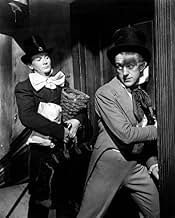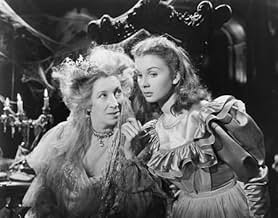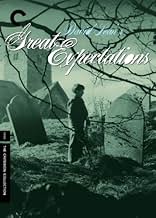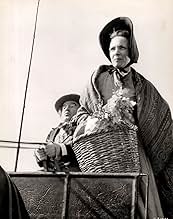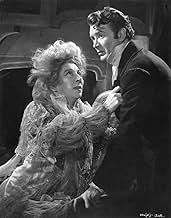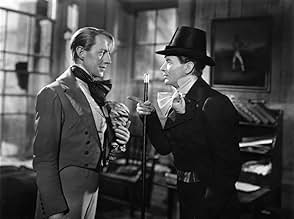NOTE IMDb
7,8/10
28 k
MA NOTE
Un simple orphelin devient soudainement un gentleman grâce à un bienfaiteur inconnu.Un simple orphelin devient soudainement un gentleman grâce à un bienfaiteur inconnu.Un simple orphelin devient soudainement un gentleman grâce à un bienfaiteur inconnu.
- Réalisation
- Scénario
- Casting principal
- Récompensé par 2 Oscars
- 11 victoires et 4 nominations au total
Tony Wager
- Young Pip
- (as Anthony Wager)
O.B. Clarence
- The Aged Parent
- (as O. B. Clarence)
Avis à la une
I came to watch this film with no knowledge of the book, having never read it and only the vaguest knowledge of a couple of the characters - Magwitch the escaped convict and the jilted Miss Haversham. I had absolutely no idea how events would turn out or what would happen to the characters involved. Good for me - no baggage!!
Taken, then, in its own right I can say that I was quite staggered at the overall quality of this film in every respect and from the very opening shots: The acting, cinematography, costumes, sets, lighting, effects etc. etc. were all perfect and gave no hint of the film's vintage. Surprise surprise (or maybe no surprise), the storyline was quite superb - the ripe 'Dickensian' dialogue was a pleasure to hear and the plot was intelligent and interesting while maintaining a steady pace throughout.
All in all, a very pleasant experience for me and I'm glad it eventually found its way onto my radar!
So - a timeless masterpiece in my opinion and well worth watching by anyone looking for a break from modern CGI-laden disaster/action movies or who do not want to see yet another instance of the Americans saving the world from extra-terrestrial menace.
Nine out of ten without a moment's hesitation....
Taken, then, in its own right I can say that I was quite staggered at the overall quality of this film in every respect and from the very opening shots: The acting, cinematography, costumes, sets, lighting, effects etc. etc. were all perfect and gave no hint of the film's vintage. Surprise surprise (or maybe no surprise), the storyline was quite superb - the ripe 'Dickensian' dialogue was a pleasure to hear and the plot was intelligent and interesting while maintaining a steady pace throughout.
All in all, a very pleasant experience for me and I'm glad it eventually found its way onto my radar!
So - a timeless masterpiece in my opinion and well worth watching by anyone looking for a break from modern CGI-laden disaster/action movies or who do not want to see yet another instance of the Americans saving the world from extra-terrestrial menace.
Nine out of ten without a moment's hesitation....
This adaptation of Charles Dickens's classic novel, directed by David Lean from a script he co-adapted, and photographed by Guy Green, is a miracle of invention, economy and detail. Every piece on every set; every line of dialogue; every gesture and line reading of every actor; every black-and-white frame of this beautiful film seems perfect. Dickens's characters, situations and themes are all vividly dramatized. Pip, Pocket, Joe, Mr. Jaggers, Magwitch andunforgettablyMiss Havisham, are all here and all ready to move, amuse, frighten and entertain anyone willing to spend time with them.
I haven't read the book since I was thirteen. I vividly remember Miss Havisham, but I don't remember noting the contrast between her and Magwitch, the ex-convict. She becomes bitter and vengeful after a great heartbreak; he becomes great of heart through one small act of kindness. That's what made the movie for me this time; but clearly there's richness to spare for future viewings.
There is so much here not only for Dickens fans, but for anyone who loves movies. I especially liked that shot from Pip's point of view as he becomes sick. It's the kind of crazy effect beloved of filmmakers, too; but I love it not so much for itself, but for being the right shot at the right moment. Some directors hide, others show off, but directors like David Lean know how to do both and know when to do which.
I haven't read the book since I was thirteen. I vividly remember Miss Havisham, but I don't remember noting the contrast between her and Magwitch, the ex-convict. She becomes bitter and vengeful after a great heartbreak; he becomes great of heart through one small act of kindness. That's what made the movie for me this time; but clearly there's richness to spare for future viewings.
There is so much here not only for Dickens fans, but for anyone who loves movies. I especially liked that shot from Pip's point of view as he becomes sick. It's the kind of crazy effect beloved of filmmakers, too; but I love it not so much for itself, but for being the right shot at the right moment. Some directors hide, others show off, but directors like David Lean know how to do both and know when to do which.
When David Lean directed Great Expectations, he used black and white, even though color was available. From the very first scene, you see that the black and white brings out a quality in the film, that wouldn't have been achieved with color. The black and white makes the film seem simpler than it really is. Great Expectations is a film, which ends very nicely for the characters, but their journeys throughout the film are not.
Pip sees himself for the rude snob he became, and Estella prides herself for being a heartless, ruthless bitch (for lack of a better word), and Miss Havisham is cold, and simply out to destroy men. The only person in this film who is not arrogant, or evil is the simple Joe.
I am far from a film expert. Infact, I only watched this movie because I am studying Great Expectations at school. However, after hours of in-depth discussion, there is so much more to this film than meets the eye. My favorite scenes are those in the first quarter of an hour. Lean's use of Silhouettes gives the search for the two escaped convicts a feel of war, and creates an atmosphere of tension very well. It also introduces the key characters in the story excellently.
As far as the story goes, I found it much easier on the head to watch than the book was to read. While it wasn't close in length to books i've read before (I think it's shorter than my little brother's "Harry Potter" books), it took me close to 30 hours to read. The movie compacts the majority of the book into 2 hours of film. The exclusion of characters like Orlick I have no problem with, as they are nearly completely irrelevant to the story. Lean explains the death of Pip's sister in less than 10 seconds, while the book takes somewhere in the region of 10 pages.
The acting is excellent. Alec Guinness was the only actor I had heard of, and that was only thanks to George Lucas. John Mills was interesting to watch, and after seeing the movie, I didn't know weather to like Pip for how he ended up, or to see him for the nasty person he had changed into (and come back from).
Only when watching it for the second time, did i realise the thought behind the direction. When Magwitch reappears, the atmosphere from their first meeting is created exactly; even the wind sounds the same. The sets were also incredible, and remade 19th century England perfectly. Ms. Havisham's `Statis House' was particularly memorable for me, as it is exactly how I pictured it from reading.
David Lean's Great Expectations set a benchmark in 1946 for great movies. It was nominated and won several Oscars, and is still enjoyed today. Every aspect of this film was enjoyable, it tells a great story, and if you look closer, you will appreciate the art of film making a little more, as I have.
Pip sees himself for the rude snob he became, and Estella prides herself for being a heartless, ruthless bitch (for lack of a better word), and Miss Havisham is cold, and simply out to destroy men. The only person in this film who is not arrogant, or evil is the simple Joe.
I am far from a film expert. Infact, I only watched this movie because I am studying Great Expectations at school. However, after hours of in-depth discussion, there is so much more to this film than meets the eye. My favorite scenes are those in the first quarter of an hour. Lean's use of Silhouettes gives the search for the two escaped convicts a feel of war, and creates an atmosphere of tension very well. It also introduces the key characters in the story excellently.
As far as the story goes, I found it much easier on the head to watch than the book was to read. While it wasn't close in length to books i've read before (I think it's shorter than my little brother's "Harry Potter" books), it took me close to 30 hours to read. The movie compacts the majority of the book into 2 hours of film. The exclusion of characters like Orlick I have no problem with, as they are nearly completely irrelevant to the story. Lean explains the death of Pip's sister in less than 10 seconds, while the book takes somewhere in the region of 10 pages.
The acting is excellent. Alec Guinness was the only actor I had heard of, and that was only thanks to George Lucas. John Mills was interesting to watch, and after seeing the movie, I didn't know weather to like Pip for how he ended up, or to see him for the nasty person he had changed into (and come back from).
Only when watching it for the second time, did i realise the thought behind the direction. When Magwitch reappears, the atmosphere from their first meeting is created exactly; even the wind sounds the same. The sets were also incredible, and remade 19th century England perfectly. Ms. Havisham's `Statis House' was particularly memorable for me, as it is exactly how I pictured it from reading.
David Lean's Great Expectations set a benchmark in 1946 for great movies. It was nominated and won several Oscars, and is still enjoyed today. Every aspect of this film was enjoyable, it tells a great story, and if you look closer, you will appreciate the art of film making a little more, as I have.
Few directors have ever matched David Lean's ability to bring great literary works to life on film, and this is one of his best productions. The Dickens novel itself is so good that even routine film adaptations of it are usually quite watchable, but this version is exceptional, with atmosphere, settings, photography, and characters that do full justice to the original. From the very beginning, with a wonderful realization of the graveyard scene, you are drawn into the world of Pip and the other characters, and feel that you can understand their concerns and dilemmas.
One of the things that makes "Great Expectations" such a classic story is that it adds some real depth to Dickens's usual slightly exaggerated characters, so that they are both memorable and thought-provoking. Characters such as Miss Havisham and Magwitch are interesting in their own right, besides serving as vital influences on Pip's life. Here the fine cast and directing help to realize the potential of the characters, making for an interesting story that also has some things to say. John Mills brings out Pip's innocence and earnestness very believably, and the supporting cast works quite well too. Some of them seem to be almost exactly what Dickens would have envisioned, such as Jean Simmons as the young Estella and Francis Sullivan as Jaggers (a role he also played in an earlier version).
This is exactly what a film version of a classic book should be, keeping the most important themes and events from the story and using the visuals to bring its world to life. It's an excellent movie that is enjoyable and nicely done in every respect.
One of the things that makes "Great Expectations" such a classic story is that it adds some real depth to Dickens's usual slightly exaggerated characters, so that they are both memorable and thought-provoking. Characters such as Miss Havisham and Magwitch are interesting in their own right, besides serving as vital influences on Pip's life. Here the fine cast and directing help to realize the potential of the characters, making for an interesting story that also has some things to say. John Mills brings out Pip's innocence and earnestness very believably, and the supporting cast works quite well too. Some of them seem to be almost exactly what Dickens would have envisioned, such as Jean Simmons as the young Estella and Francis Sullivan as Jaggers (a role he also played in an earlier version).
This is exactly what a film version of a classic book should be, keeping the most important themes and events from the story and using the visuals to bring its world to life. It's an excellent movie that is enjoyable and nicely done in every respect.
Charles Dickens certainly liked to write his novels from a child's point of view. Oliver Twist, David Copperfield, and Great Expectations all start with the hero/protagonist as a child. Only young Oliver Twist of the three I mentioned ended still a child in the novel's conclusion. In Oliver Twist, young Oliver is reunited with his propertied and somewhat wealthy grandfather looking to rise in station from his humble background.
Young Pip, short for Philip Pirrup, is also of humble background in Great Expectations. His parents are killed when he's young, he lives with his sister and her husband who is a blacksmith. During his childhood he befriends a convict on the run. Later on for mysterious reasons to him, he comes under the protection of eccentric old Miss Haversham who wants him as a companion for her adopted child Estella.
Later on as an adult, he has a mysterious benefactor who provides him income enough to live as a gentlemen, something he fervently desired all his life. It seems to be a dream come true. But there are still quite a few bumps on Pip's road of life.
Charles Dickens despaired of the poverty he saw in early Victorian Great Britain. But he also knew that riches alone did not necessarily guarantee happiness. It didn't for Scrooge, for Ms. Havisham, and certainly not for John Mills as the adult Pip. Nor does it for Valerie Hobson who inherits Ms. Havisham's estate.
Mills and Hobson are a perfectly cast pair of leads in this version of Great Expectations. Alec Guinness began a long association with director David Lean as Herbert Pocket, Pip's friend and roommate.
Finlay Currie, the craggy Scot's player who usually played kindly old gentlemen, turns out to be kinder indeed than originally presented as convict Abel Magwitch. It's a different kind of part for him.
Martita Hunt as Ms. Havisham plays a part all to familiar to me. I had an elderly relative in my family a lot like her, bitter at the world and taking it out on all around her.
My favorite in the film though is Francis L. Sullivan. Usually Sullivan's characters are crooked and/or corrupt in most of his films. As attorney Jaggers who seems to have an unseen hand in all the proceedings he actually is working for the ultimate benefit of both of our leads.
In Dickens's world, wealth can corrupt as easily as poverty. It's the character inside you that counts and that fact is not better demonstrated than in this adaption of Great Expectations.
Young Pip, short for Philip Pirrup, is also of humble background in Great Expectations. His parents are killed when he's young, he lives with his sister and her husband who is a blacksmith. During his childhood he befriends a convict on the run. Later on for mysterious reasons to him, he comes under the protection of eccentric old Miss Haversham who wants him as a companion for her adopted child Estella.
Later on as an adult, he has a mysterious benefactor who provides him income enough to live as a gentlemen, something he fervently desired all his life. It seems to be a dream come true. But there are still quite a few bumps on Pip's road of life.
Charles Dickens despaired of the poverty he saw in early Victorian Great Britain. But he also knew that riches alone did not necessarily guarantee happiness. It didn't for Scrooge, for Ms. Havisham, and certainly not for John Mills as the adult Pip. Nor does it for Valerie Hobson who inherits Ms. Havisham's estate.
Mills and Hobson are a perfectly cast pair of leads in this version of Great Expectations. Alec Guinness began a long association with director David Lean as Herbert Pocket, Pip's friend and roommate.
Finlay Currie, the craggy Scot's player who usually played kindly old gentlemen, turns out to be kinder indeed than originally presented as convict Abel Magwitch. It's a different kind of part for him.
Martita Hunt as Ms. Havisham plays a part all to familiar to me. I had an elderly relative in my family a lot like her, bitter at the world and taking it out on all around her.
My favorite in the film though is Francis L. Sullivan. Usually Sullivan's characters are crooked and/or corrupt in most of his films. As attorney Jaggers who seems to have an unseen hand in all the proceedings he actually is working for the ultimate benefit of both of our leads.
In Dickens's world, wealth can corrupt as easily as poverty. It's the character inside you that counts and that fact is not better demonstrated than in this adaption of Great Expectations.
Le saviez-vous
- AnecdotesSir Alec Guinness admired the way Sir David Lean directed him, singling out a close-up in which he had to laugh out loud, and which he struggled to make look unmanufactured. Lean told him to forget about the whole thing, sat by his side, and made a little signal to the camera to start turning in the course of the conversation. He said something which made Guinness laugh and then said, "Cut." Guinness: "So he got this shot on a totally false premise, but thank God. I don't think I would have ever achieved it otherwise."
- GaffesAt the end, when Pip is persuading Estella to leave Satis House with him, a 'Chad' is clearly visible drawn on the screen behind him (Chads were a popular form of graffiti in the 1940s - a character with a big nose looking over a wall). Chad is a British term; the American equivalent would be Kilroy, as in 'Kilroy was here'.
- Crédits fousThe identity of the actress playing Molly is never revealed, because this would constitute a spoiler.
- Versions alternativesIn some prints, after the fifteen minute "convict episode" at the beginning of the film ends, a voice-over by the adult Pip (John Mills) says, "it was a year later", as Mrs. Joe arrives home in the carriage. As now usually shown, there is no voice-over in this sequence.
- ConnexionsFeatured in Moscow in Madrid (1965)
Meilleurs choix
Connectez-vous pour évaluer et suivre la liste de favoris afin de recevoir des recommandations personnalisées
Détails
- Date de sortie
- Pays d’origine
- Site officiel
- Langue
- Aussi connu sous le nom de
- Grandes esperanzas
- Lieux de tournage
- St Mary's Marshes, Kent, Angleterre, Royaume-Uni(opening sequence - Pip and Herbert Pocket ride in rowboat)
- Société de production
- Voir plus de crédits d'entreprise sur IMDbPro
Box-office
- Budget
- 350 000 £GB (estimé)
- Montant brut mondial
- 33 408 $US
- Durée1 heure 58 minutes
- Couleur
- Rapport de forme
- 1.37 : 1
Contribuer à cette page
Suggérer une modification ou ajouter du contenu manquant

Lacune principale
By what name was Les grandes espérances (1946) officially released in India in Hindi?
Répondre

